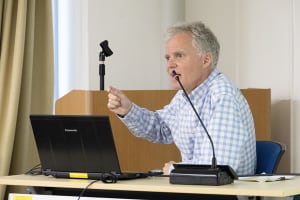Report
On Thursday, June 19, 2025, at 2 p.m., Professor Lloyd Ridgeon gave a presentation called, “‘Better a live sparrow than a stuffed Eagle’: Nineteenth-Century British Orientalism and Perceptions of Persian Sufism.” In this presentation, it was argued that nineteenth-century British perceptions of Persian Sufism contribute to the understanding of the contemporary, fraught relations between the two nations. An analysis of the sources (essays, translations, missionary works, travel writings) suggest the British perceptions may be categorised in three ways. The first concerns the quest to discover Sufi origins and includes debates about Aryanism; the second posits the paradigm of Sufis as “dirty and libertarian dervishes”; and the final category presents a more positive perspective of Sufism. Subsequently, the presentation discussed the veracity, implications and effects of all three, including an analysis of how some of these views have been embraced by Iranians in the twentieth century in nationalist depictions of Iranian culture and religion.
Event Details
Date and Time: June 19 (Thu), 2025, 14:00-16:00 (Japan Time)
Venue: Main Conference Room (3F), Institute for Advanced Studies on Asia, University of Tokyo
Title: 'Better a live sparrow than a stuffed eagle': Nineteenth-century British Orientalism and perceptions of Persian Sufism
Speaker: Lloyd Ridgeon (Professor, Institute for Advanced Studies on Asia)
Moderator: Kazuo Morimoto (Professor, Institute for Advanced Studies on Asia)
Language: English
Abstract: Nineteenth-century British perceptions of Persian Sufism contribute to the understanding of the contemporary, fraught relations between the two nations. By analysing the sources (essays, translations, missionary works, travel writings) this essay categorises British perceptions in three ways. The first concerns the quest to discover Sufi origins and includes debates about Aryanism; the second posits the paradigm of Sufis as “dirty and libertarian dervishes”; and the final category presents a more positive perspective of Sufism. Subsequently, the essay discusses the veracity, implications and effects of all three, including an analysis of how some of these views have been embraced by Iranians in the twentieth century in nationalist depictions of Iranian culture and religion. Finally, an assessment is made about applying Said’s concept of Orientalism to nineteenth-century British Orientalism.
Keywords: Nineteenth-century British Orientalism, Aryanism, Persian Sufism, dervishes, E. G. Browne




